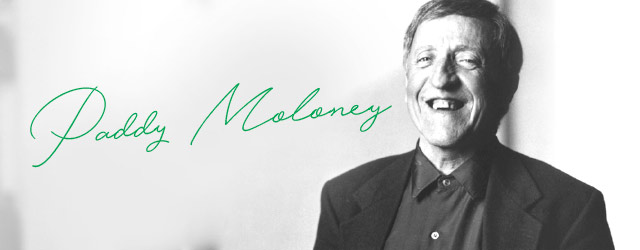By Peter Makem
For a few years in my early life I played the uilleann pipes. There was a set in the house bought by my father from a traveller piper in Keady and from time to time, I strapped them on and started to learn the art. It was a difficult instrument to master as it involved the two elbows supplying air at certain pressures, the two hands fingering the chanter and a wrist to play the regulators if harmonies were required.
Every piper that I knew always performed with a certain solemnity. Whether in the fastest of reels or the slowest of Irish airs, never a smile appeared out of the total absorption in their art, a faraway look— all except one. Paddy Maloney.
No piper ever remotely revealed such a sense of enthusiasm and jubilation in their art, such a sense of abandonment and who joyously wanted to share it with the whole of creation, to bring outside musicians and performers into the inner circle, wrap the sound of the pipes and tin whistle around all artists and re-set, re-present Irish traditional music for the full attention of planet earth.
Whether in the fastest of reels or the slowest of Irish airs, never a smile appeared out of the total absorption in their art, a faraway look—all except one. Paddy Maloney.
The Chieftains were formed in Dublin in 1962, by Paddy Maloney, Sean Potts and Michael Tubridy. They have won six Grammys during their career and they were given a Lifetime Achievement Award at the BBC Radio 2 Folk Awards in 2002.
So popular did they become and so professional their art that the Irish government awarded them the honorary title of “Ireland’s Musical Ambassadors” in 1989.
Born into a musical family in Donnycarney, north Dublin, Maloney formed several groups with musicians in duets and trios before forming the band that would become The Chieftains and had their first rehearsals at Moloney’s house, with David Fallon and Martin Fay joining the original three.
In 1973, their popularity began to spread to the United States when their previous albums were released there by Island Records and continued to release successful records throughout the 1970s and 1980s, and went on to collaborate with many other well-known musicians and singers such as Pavarotti, the Rolling Stones, Madonna, Sinéad O’Connor and Roger Daltrey.
Their overall success came from the driving force of Paddy Maloney himself, the sheer professionalism of the individual musicians in the band and the openness to all modes of bringing Irish music to the widest audiences.
At his Funeral Mass in the village of Glendalough, Co. Wicklow attended by President Higgins, mourners heard that he just “faded away” in later years after he was no longer able to perform music for his fans due to the Covid-19 pandemic.
He lived for the performance, the great crescendos and dramatic changes of rhythm, the sudden entrances of the tin whistle and the return to the pipes, the solo performances of the members of the group in all their superb mastery of their instruments and the eventual roar and embrace of the audiences.
He is survived by his wife Rita and four children. And in the wider sense, he is survived by a sixty-year long unparalleled affirmation of Irish traditional music.

